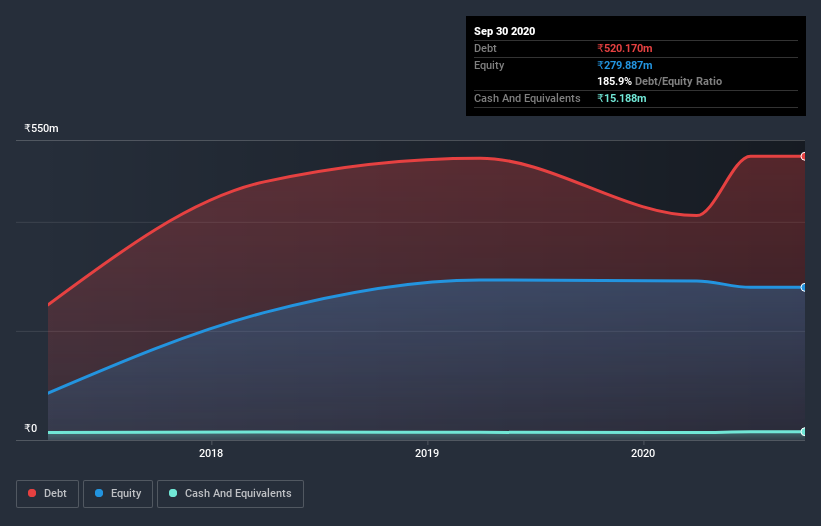
Warren Buffett famously said, 'Volatility is far from synonymous with risk.' So it seems the smart money knows that debt - which is usually involved in bankruptcies - is a very important factor, when you assess how risky a company is. As with many other companies Shanti Overseas (India) Limited (NSE:SHANTI) makes use of debt. But is this debt a concern to shareholders?
Why Does Debt Bring Risk?
Generally speaking, debt only becomes a real problem when a company can't easily pay it off, either by raising capital or with its own cash flow. Ultimately, if the company can't fulfill its legal obligations to repay debt, shareholders could walk away with nothing. However, a more common (but still painful) scenario is that it has to raise new equity capital at a low price, thus permanently diluting shareholders. Of course, debt can be an important tool in businesses, particularly capital heavy businesses. When we think about a company's use of debt, we first look at cash and debt together.
View our latest analysis for Shanti Overseas (India)
What Is Shanti Overseas (India)'s Net Debt?
As you can see below, at the end of September 2020, Shanti Overseas (India) had ₹520.2m of debt, up from ₹411.4m a year ago. Click the image for more detail. However, because it has a cash reserve of ₹15.2m, its net debt is less, at about ₹505.0m.

A Look At Shanti Overseas (India)'s Liabilities
According to the last reported balance sheet, Shanti Overseas (India) had liabilities of ₹419.3m due within 12 months, and liabilities of ₹154.1m due beyond 12 months. Offsetting these obligations, it had cash of ₹15.2m as well as receivables valued at ₹334.2m due within 12 months. So its liabilities outweigh the sum of its cash and (near-term) receivables by ₹224.0m.
This is a mountain of leverage relative to its market capitalization of ₹242.7m. This suggests shareholders would be heavily diluted if the company needed to shore up its balance sheet in a hurry. When analysing debt levels, the balance sheet is the obvious place to start. But it is Shanti Overseas (India)'s earnings that will influence how the balance sheet holds up in the future. So when considering debt, it's definitely worth looking at the earnings trend. Click here for an interactive snapshot.
Over 12 months, Shanti Overseas (India) made a loss at the EBIT level, and saw its revenue drop to ₹1.6b, which is a fall of 5.0%. That's not what we would hope to see.
Caveat Emptor
Over the last twelve months Shanti Overseas (India) produced an earnings before interest and tax (EBIT) loss. Indeed, it lost ₹19m at the EBIT level. Considering that alongside the liabilities mentioned above does not give us much confidence that company should be using so much debt. Quite frankly we think the balance sheet is far from match-fit, although it could be improved with time. However, it doesn't help that it burned through ₹82m of cash over the last year. So suffice it to say we consider the stock very risky. When analysing debt levels, the balance sheet is the obvious place to start. However, not all investment risk resides within the balance sheet - far from it. For example, we've discovered 4 warning signs for Shanti Overseas (India) (3 don't sit too well with us!) that you should be aware of before investing here.
When all is said and done, sometimes its easier to focus on companies that don't even need debt. Readers can access a list of growth stocks with zero net debt 100% free, right now.
If you decide to trade Shanti Overseas (India), use the lowest-cost* platform that is rated #1 Overall by Barron’s, Interactive Brokers. Trade stocks, options, futures, forex, bonds and funds on 135 markets, all from a single integrated account. Promoted
New: Manage All Your Stock Portfolios in One Place
We've created the ultimate portfolio companion for stock investors, and it's free.
• Connect an unlimited number of Portfolios and see your total in one currency
• Be alerted to new Warning Signs or Risks via email or mobile
• Track the Fair Value of your stocks
This article by Simply Wall St is general in nature. It does not constitute a recommendation to buy or sell any stock, and does not take account of your objectives, or your financial situation. We aim to bring you long-term focused analysis driven by fundamental data. Note that our analysis may not factor in the latest price-sensitive company announcements or qualitative material. Simply Wall St has no position in any stocks mentioned.
*Interactive Brokers Rated Lowest Cost Broker by StockBrokers.com Annual Online Review 2020
Have feedback on this article? Concerned about the content? Get in touch with us directly. Alternatively, email editorial-team (at) simplywallst.com.
About NSEI:SHANTI
Shanti Overseas (India)
Engages in the processing and trading of agri commodities in India.
Adequate balance sheet slight.
Similar Companies
Market Insights
Community Narratives




